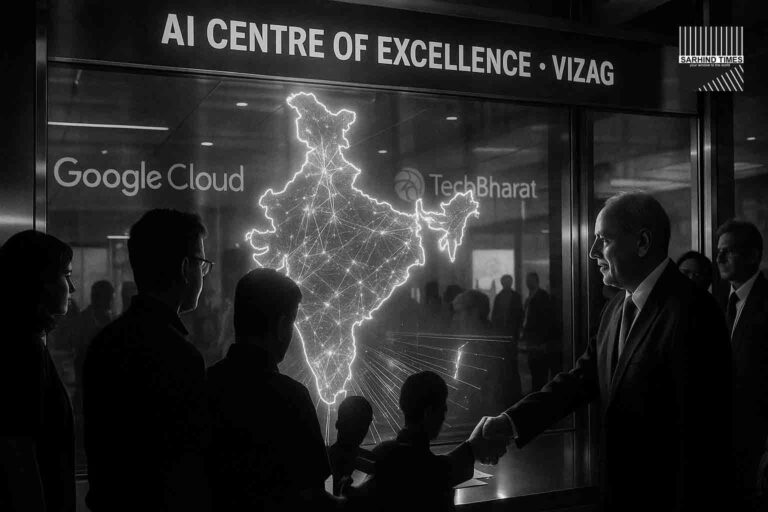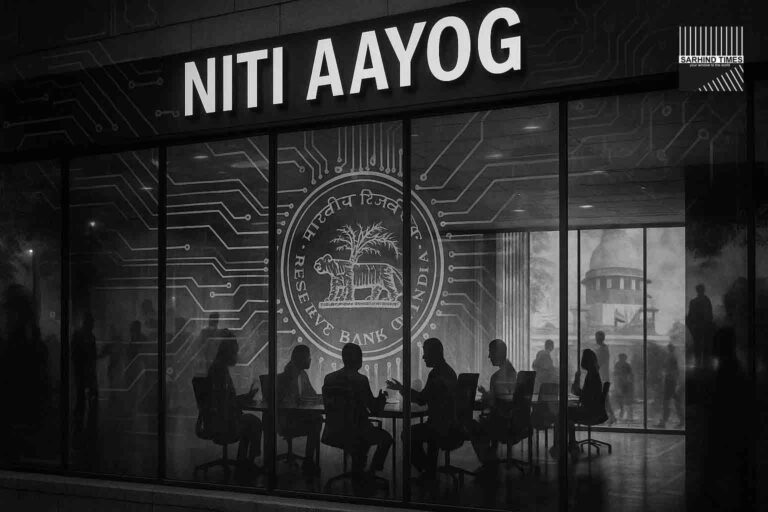By SarhindTimes Tech Desk | Bengaluru / New Delhi
Date: October 9, 2025
In a major boost to India’s AI and innovation ecosystem, Anthropic — the San Francisco–based artificial intelligence company behind the Claude family of models — has announced plans to open its first India office in early 2026, selecting Bengaluru as the strategic base for its Asia-Pacific operations.
The move signals the company’s intent to deepen engagement with India’s rapidly expanding tech ecosystem and growing enterprise demand for trustworthy, safe, and large-scale AI systems.
1. Anthropic Enters India: The Strategic Leap
The decision was confirmed in a statement by Anthropic’s co-founder and CEO, Dario Amodei, who said the India office will serve as both a research and enterprise partnership hub.
India, according to the company, is now its second-largest market for Claude usage globally — driven by developers, startups, and corporates integrating the model into products ranging from chat interfaces and workflow automation to creative applications.
“India represents a unique intersection of scale, innovation, and digital adoption,” said an Anthropic spokesperson.
“Bengaluru offers the right mix of research talent, developer culture, and policy dialogue that matches our global mission of building safe and reliable AI systems.”
2. Why Bengaluru? India’s Deep Tech Magnet
Bengaluru’s selection aligns with its status as India’s AI capital — home to premier institutes like IISc, IIT Bengaluru, and R&D centres of global majors such as Google DeepMind, Microsoft, and NVIDIA.
Anthropic’s local office is expected to focus on:
- Enterprise integration of Claude into banking, healthcare, and retail systems;
- Research collaboration with universities on AI alignment and interpretability;
- Developer ecosystem programs for startups and coders building with Claude APIs.
City officials from Karnataka’s IT Department welcomed the move, calling it a “validation of Bengaluru’s global position in responsible AI.”
“We are working closely with the Ministry of Electronics and IT (MeitY) to ensure Bengaluru becomes the continental hub for AI research partnerships,” said Priyank Kharge, Karnataka’s IT Minister.
3. A Competitive AI Landscape: India at the Center
Anthropic’s entry intensifies competition among global AI leaders expanding into India.
- OpenAI recently scaled its India partnerships through Microsoft Azure and enterprise pilots in Mumbai and Hyderabad.
- Google DeepMind is expanding collaborations with IITs and BITS Pilani for AI safety research.
- Meta AI continues open-source initiatives and Llama model testing with Indian startups.
For India, these developments reinforce its dual identity as both a user market and innovation contributor in the global AI race.
“India’s demographic advantage in AI talent is its biggest soft power,”
noted Dr. Rajeev Chandrasekhar, Minister of State for IT and Skill Development.
“With Anthropic joining the mix, our startup ecosystem gains another global collaborator in the responsible AI space.”
4. What Is Anthropic? A Quick Background
Founded in 2021 by Dario Amodei, Daniela Amodei, and a group of former OpenAI researchers, Anthropic was built around the philosophy of “constitutional AI” — a method that trains large language models to follow human-aligned ethical principles using self-supervision.
Its flagship product, Claude, competes directly with OpenAI’s ChatGPT, Google’s Gemini, and Mistral’s Mixtral models.
Anthropic’s investors include Google, Amazon, and Salesforce Ventures, with funding exceeding $8 billion as of mid-2025.
The company’s focus on AI safety, transparency, and interpretability has made it a preferred choice for sectors with compliance obligations — especially finance, healthcare, and education.
5. India as a Key Market: Numbers That Matter
Anthropic data indicates that India accounts for nearly 18% of global Claude usage, particularly among:
- Software developers using Claude API for code generation and debugging;
- Startups leveraging the model for multilingual customer engagement;
- Large corporates experimenting with AI assistants and summarization tools;
- Educational platforms embedding Claude for tutoring and exam prep.
A senior industry analyst at NASSCOM estimates that India’s enterprise AI spending will surpass $9 billion by 2027, with conversational and reasoning models forming a major component.
“Anthropic’s localization push positions it to capture both developer mindshare and enterprise trust,” said Debjani Ghosh, NASSCOM President.
6. Policy Conversations on AI Safety
CEO Dario Amodei is expected to visit New Delhi and Bengaluru in mid-2026 to meet policymakers, including representatives from MeitY, NITI Aayog, and Digital India Corporation, to discuss frameworks for AI safety, transparency, and risk governance.
India is finalizing its Digital India Act and national AI Governance Framework, expected to emphasize ethical AI, data protection, and open innovation.
Policy experts say these conversations could shape public-sector AI adoption — in e-governance, healthcare diagnostics, and education technology.
“AI safety is no longer just a Silicon Valley debate; it’s an economic priority,” said Arvind Gupta, former head of the Digital India Foundation.
“Anthropic’s engagement could help align global safety principles with India’s unique data and diversity realities.”
7. Enterprise and Startup Ecosystem Response
India’s startup founders welcomed the news with enthusiasm.
“Claude’s reasoning ability is superior for structured workflows,” said Ananya Gupta, founder of AI content startup ScriptWise.ai, which uses Anthropic APIs.
“Having local support will improve latency, documentation, and compliance with Indian data norms.”
Large enterprises, too, see promise.
A senior executive at HDFC Bank noted that AI reasoning tools are being evaluated for risk assessment, credit scoring, and chat-based employee training.
For startups, a local office means access to developer events, AI accelerators, and hackathons similar to those hosted by Google and Microsoft.
8. University Collaborations and Research Footprint
Anthropic’s India expansion includes plans to partner with premier research institutes such as:
- Indian Institute of Science (IISc)
- IIT Delhi & IIT Madras
- International Institute of Information Technology (IIIT) network
These collaborations will center on:
- AI alignment and interpretability research
- Reinforcement learning safety studies
- Open datasets for multi-lingual model training
Such academia–industry collaboration echoes Anthropic’s philosophy of open dialogue on AI risks.
“We’ll prioritize partnerships that advance safe model development, especially in low-resource languages,” said Daniela Amodei, Anthropic’s President.
9. AI in India’s Policy Context
India’s AI policy journey has moved rapidly from experimentation to governance.
Key milestones include:
- The National AI Mission (AI for All) launched in 2018;
- AI centers of excellence under MeitY and NASSCOM;
- The draft Digital India Act (2025) addressing algorithmic accountability;
- The government’s push for AI in agriculture, healthcare, and skilling.
Anthropic’s entry could influence upcoming regulatory dialogues on foundation models, model transparency reports, and AI certification mechanisms.
“India wants innovation, but also guardrails,” said Rituparna Chatterjee, policy analyst at Carnegie India.
“Having companies like Anthropic participate from the ground up will ensure co-created frameworks.”
10. Global Implications: Expanding Asia Footprint
Bengaluru will likely be Anthropic’s first full-scale office in Asia, complementing smaller teams in London and Toronto.
The company plans to hire around 250 employees in the first year, spanning:
- Research scientists and data engineers;
- Policy analysts;
- Developer-relations and enterprise-sales teams.
Anthropic’s Asia focus mirrors that of OpenAI and Google — diversifying beyond the West to tap fast-growing AI adoption in emerging economies.
11. India’s Talent Advantage
India produces over 3 million STEM graduates annually, with strong representation in machine learning, data science, and computational linguistics.
The median salary for AI researchers in India remains one-sixth of U.S. averages, allowing global firms to scale R&D efficiently.
“Talent density is Bengaluru’s real moat,” said Anand Mahindra, industrialist and investor.
“Every major frontier-model lab wants proximity to India’s coders.”
12. The Race for Responsible AI
Globally, AI companies face growing scrutiny around bias, misinformation, and job displacement.
Anthropic has positioned itself as a leader in AI alignment and ethics, publishing papers on model behavior control and transparent feedback loops.
In India, this could translate into safe deployment frameworks for enterprises, avoiding reputational risks in sectors like banking and education.
“Companies want AI that’s powerful but predictable,” said Sundar Subramaniam, AI policy researcher at IIT Madras.
“Anthropic’s philosophy fits the Indian government’s emphasis on trust and explainability.”
13. Economic Impact: Beyond Symbolism
Bengaluru’s economy stands to gain from new high-skill jobs and partnerships.
Real-estate analysts say Anthropic’s arrival could further consolidate Whitefield and Outer Ring Road corridors as preferred AI clusters.
The state government expects ancillary benefits — from upskilling programs to export revenue through AI services.
“Each global lab that sets up here creates ripple effects in education, infrastructure, and intellectual property,” said Dr. Ashwath Narayan, former deputy CM of Karnataka.
14. The Broader Message: AI’s Global Rebalancing
Anthropic’s India decision symbolizes a rebalancing of AI geography — moving beyond U.S. and European dominance toward a multi-hub global ecosystem.
It also aligns with India’s ambition to become the world’s third-largest AI economy by 2030, as per NITI Aayog projections.
“AI can’t remain centralized,” said Dario Amodei in a 2024 panel.
“To make it beneficial for humanity, we must democratize access — and India is central to that mission.”
15. Editorial Perspective: India’s AI Moment Arrives
Anthropic’s entry is more than a corporate expansion — it’s a signal of confidence in India’s regulatory maturity, technical depth, and innovation appetite.
For Bengaluru, the move reinforces its identity as a global AI hub that now hosts every major frontier-model player.
For India, it underscores the shift from being an AI consumer to an active collaborator shaping the technology’s ethical future.
As global attention swings toward safe and transparent AI, India’s blend of scale, policy experimentation, and talent diversity may prove to be the ideal testing ground.
The year 2026, therefore, won’t just mark Anthropic’s office opening — it could mark India’s arrival at the AI frontier.
#AI #Anthropic #Bengaluru #Startups #TechPolicy #Claude #ArtificialIntelligence #Innovation #ResponsibleAI #DigitalIndia






















+ There are no comments
Add yours